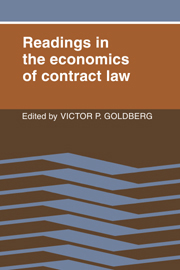Book contents
- Frontmatter
- Contents
- Preface
- Readings in the economics of contract law
- Part I Some preliminaries
- Part II Contract law and the least cost avoider
- Part III The expectation interest, the reliance interest, and consequential damages
- Part IV The lost-volume seller puzzle
- 4.1 An economic analysis of the lost-volume retail seller
- Questions and notes on the seller's lost profits
- Part V Specific performance and the cost of completion
- Part VI Power, governance, and the penalty clause puzzle
- Part VII Standard forms and warranties
- Part VIII Duress, preexisting duty, and good faith modification
- Part IX Impossibility, related doctrines, and price adjustment
- Questions and notes on impossibility and price adjustment
- References
- Index of cases
- Author index
- Subject index
Questions and notes on the seller's lost profits
Published online by Cambridge University Press: 10 November 2010
- Frontmatter
- Contents
- Preface
- Readings in the economics of contract law
- Part I Some preliminaries
- Part II Contract law and the least cost avoider
- Part III The expectation interest, the reliance interest, and consequential damages
- Part IV The lost-volume seller puzzle
- 4.1 An economic analysis of the lost-volume retail seller
- Questions and notes on the seller's lost profits
- Part V Specific performance and the cost of completion
- Part VI Power, governance, and the penalty clause puzzle
- Part VII Standard forms and warranties
- Part VIII Duress, preexisting duty, and good faith modification
- Part IX Impossibility, related doctrines, and price adjustment
- Questions and notes on impossibility and price adjustment
- References
- Index of cases
- Author index
- Subject index
Summary
1. The analysis in the last part of the preceding paper invokes a variation on the Coase Theorem. This argument is extremely important in both tort and contract analysis and the reader should reflect upon it carefully. The central point is this: If the law changes so that the seller bears a particular cost instead of the buyer, sellers will in the long run have to charge a price to cover the higher cost. At the same time, buyers, who no longer bear the cost, will be willing to pay more for the good in question. Under idealized conditions, the final outcome is the same. The argument is developed in Demsetz (1973). The invariance of the outcome to the legal rule is not, however, the moral one should draw from the exercise. Rather, it suggests the factors one should consider when analyzing the impact of legal rules.
2. Suppose that Mr. Heery placed orders for delivery of a boat (that is, he signed a contract) at six different dealers. When the first boat came in, he immediately canceled the other orders (that is, he breached the contracts). Should he be able to cancel without penalty, or should the law discipline such breachers? Should the law distinguish between such a breacher and an innocent breacher, like Mr. Neri, who was hospitalized after signing his contract and no longer wanted the boat?
- Type
- Chapter
- Information
- Readings in the Economics of Contract Law , pp. 114 - 120Publisher: Cambridge University PressPrint publication year: 1982



